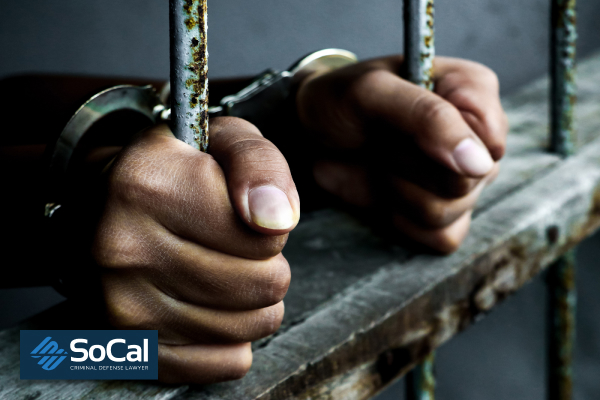
Do you find yourself or a loved one facing criminal charges? You must know the difference between a misdemeanor, misdemeanor and felony charges. Misdemeanors are generally considered less serious than felonies. However, they can still carry heavy penalties and social stigma.
Felonies, on the other hand, are more severe and can lead to long-term consequences beyond jail time. At SoCal Criminal Defense Lawyers, we provide expert defense for misdemeanor and felony charges. We guide our clients through the complexities of the legal system.
It's important to know how each type of charge affects your life, both now and in the future. A misdemeanor offense might seem minor, but it can still disrupt your life.
Felony charges are even more grievous, with the potential to alter your life permanently. They come with harsh penalties and long-term legal implications. Our team at SoCal Criminal Defense Lawyers is committed to defending your rights. We work towards the best possible outcome, regardless of the severity of the charge.
A misdemeanor charge is a less serious criminal offense than a felony and more severe than an infraction between a misdemeanor and a felony. Misdemeanors result in penalties, including fines, community service, probation, and limited jail time.
Examples of misdemeanor offenses include petty theft, vandalism, and public intoxication. The focus in misdemeanor cases is often on rehabilitation and avoiding future offenses.

Felony charges involve more serious crimes that lead to harsher penalties. Felony crimes carry longer jail time, higher fines, and bigger repercussions on a person's civil rights. Felonies can result in imprisonment in state or federal prisons rather than the local county jail or jails.
Examples of felony crimes include homicide, rape, and aggravated assault. A felony conviction can affect nearly every aspect of someone's life. This includes their ability to vote, own firearms, and secure employment.

Misdemeanor offenses cover many criminal activities deemed less severe than felonies. These can include petty theft, where the value of stolen goods is relatively low. These also include first-time offenses for driving under the influence without causing physical harm. Misdemeanors are intended to be punishable and offer the offender a chance for rehabilitation.
Petty theft is punishable by the unauthorized taking of property valued under a certain monetary threshold. This crime can result in fines, probation, and short-term jail sentences. Petty theft is often seen in cases involving shoplifting low-value items from stores.
Public intoxication is a misdemeanor that occurs when someone is visibly intoxicated in a public place. They could harm themselves or others. Penalties typically include fines and brief jail time. The goal is to deter public disturbances and ensure community safety.
Simple assault involves causing fear of harm or attempting or threatening to injure someone. It is usually classified as a misdemeanor unless it involves weapons or serious injury, which could elevate it to a felony. The consequences often include fines and probation.
Trespassing is entering or remaining on someone else's property without permission. Unless aggravated circumstances are present, it is usually considered a misdemeanor. Penalties for trespassing can include fines, community service, and, in some cases, jail time.
Disorderly conduct covers a range of behaviors that disturb the peace. These include fighting, causing excessively loud noise, or disrupting public events. This misdemeanor aims to maintain public order and safety. The penalties often include fines and probation.
Felony offenses are serious crimes with heavy penalties, including long-term imprisonment, substantial fines, and major effects on personal rights. These crimes include acts of domestic violence, large-scale theft, and other drastic violations of the law.
Murder, the unlawful killing of another human without justification or valid excuse, is a felony that results in the heaviest penalties, including life in prison or the death penalty. This crime requires intentional action with malice aforethought.
Rape is a serious felony involving forced sexual intercourse without the consent of the other party. Convictions for rape or sexual assault can result in many years in prison, required registration as a sex offender, and huge personal and social consequences.
Armed robbery involves theft combined with the use of a weapon and the threat of violence. This felony crime carries severe penalties because it poses a high risk to human life and safety. Penalties for aggravated robbery can include long prison sentences and substantial fines.
Aggravated assault is an attempt to inflict grievous bodily injury on another person with disregard for human life. This felony differs from simple assault due to the severity of the intent and the potential outcomes. Convictions often lead to lengthy jail time and heavy fines.
Driving under the influence (DUI)that results in serious injury or death is considered a serious felony offense. This crime includes situations where the driver was under the influence of alcohol or drugs and caused a crash that led to major physical injuries or fatalities. The penalties are severe due to the high risk to public safety.

The legal process for misdemeanors generally involves quicker court procedures and fewer pre-trial requirements than felonies.
Misdemeanors might not require a grand jury indictment, often resulting in shorter trials or even settlements in plea bargains without going to trial. Given the lesser penalties involved, this process is designed to be efficient.
The process is more complex for felonies, often involving preliminary hearings, detailed pre-trial motions, and potentially lengthy trials. Because of the high stakes for the federal government and the defendant, felonies require careful examination of the evidence and legal arguments. This process ensures that all legal rights are preserved and the case is treated with the gravity it warrants.
Misdemeanor convictions typically result in shorter jail terms, smaller fines, and less strict civil rights repercussions, which differs from a felony one. The focus in misdemeanor sentencing often includes rehabilitation efforts like community service or probation. These penalties reflect the lesser severity of the crimes compared to felonies.
In contrast, felonies can result in long-term imprisonment in state or federal facilities, large fines, and permanent loss of rights, such as voting and firearm ownership.
The consequences of a serious felony and a misdemeanor conviction can permeate all areas of a person's life, affecting their ability to find employment, secure housing, and maintain social relationships.

A felony conviction carries immediate penalties, including life imprisonment, and long-term consequences for a person's civil liberties. This loss can considerably affect a person's life, burdening their ability to participate in societal norms and responsibilities.
Individuals with felony convictions often face major barriers to employment. Many employers will not hire someone with a felony record due to reliability, trustworthiness, and public relations concerns. This can limit job opportunities, adversely affecting a person's ability to earn a living and reintegrate into society.
Felony convictions can trigger the loss of voting rights, a fundamental aspect of civic participation. This disenfranchisement varies by state. Some states reinstate voting rights after the completion of the sentence, while others require additional steps or have permanent disenfranchisement.
Under federal law, individuals convicted of felonies are prohibited from owning or possessing firearms. This loss of rights is meant to prevent future violence. It can affect those who previously engaged in hunting or recreational shooting. It also stops those who desire a firearm for personal protection.
Background checks can reveal misdemeanor and felony convictions. They can influence decisions made by potential employers, landlords, and other important figures. While misdemeanors may be viewed as minor, they can still raise concerns. It depends on the offense's nature and the background check's criteria.
Felonies, however, almost always raise significant red flags during background checks. The presence of a felony on a record can prevent individuals from obtaining certain professional licenses, restrict certain types of housing, and stop them from traveling abroad. The stigma associated with a felony can be difficult to overcome, and it can isolate individuals from many societal opportunities.
We know the stressful nature of facing criminal charges at SoCal Criminal Defense Lawyers. Our approach to defense is proactive and focused on achieving the best possible outcomes for our clients. We assess the evidence, develop strategic defenses, and represent you vigorously in court.
Our defense services are comprehensive, from negotiating plea deals to preparing for trial. We believe in complete preparation and aggressive representation, whether we are dealing with minor misdemeanor charges or serious felonies.
We aim to reduce the effects of a misdemeanor or felony charge on your life. We protect your rights during the legal process.
Early involvement by experienced legal counsel can affect a criminal case's outcome. An experienced attorney can help you through the legal system. We will help you recognize your rights and craft a defense strategy.
Acting quickly can also preserve important evidence and witness testimony, which is essential in defending against charges.
Our SoCal Criminal Defense Lawyers team brings more than ten years of criminal law experience to each case. We provide personalized attention, ensuring we know your case's details. Our proactive approach aims to secure the best possible outcome, regardless of the case's complexity.

If you or a loved one is facing criminal charges, seeking qualified legal help is vital. We defend our clients against all types of criminal offenses at SoCal Criminal Defense Lawyers.
Even a misdemeanor conviction can change your life forever, but a felony conviction could result in a lengthy prison sentence. You need a strong criminal defense lawyer in your corner now. Contact us today for a free consultation.
Search our site

Follow Us
"*" indicates required fields